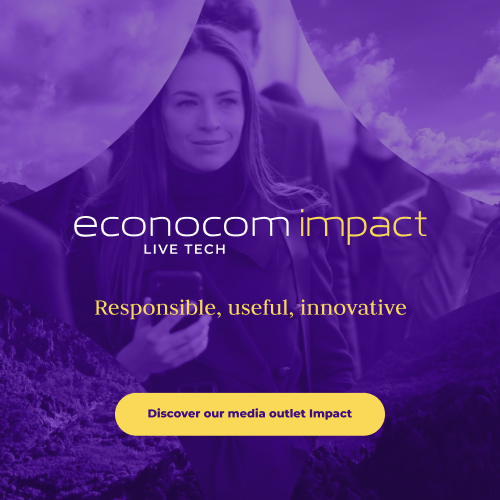Reducing CO2: acting quickly and decisively
Limiting CO2 emissions is an absolute priority, and so is the basis for our SBTi approach and our 5-year targets. We’ve long applied the same recommendations to our own digital for internal use as we do for our customers:
In 2024, we reduced our internal digital CO2 emissions by 20%, saving almost 238 tonnes of CO2 compared with 2023.
The Group has reduced its digital energy consumption for the 8th year running, by a factor of 3.8 since 2017. This is thanks to the implementation of our Ecocarbon solution, which measures the digital footprint in order to reduce it more effectively. We can thus attest to the positive impact on our internal practices.
Ultimately, our aim is to transform all our products and services (including our entire ecosystem of partners and suppliers) to make them part of a sustainable economy.
Our determination is real and we’re taking effective action. In France, for the first time in 2023 almost 100% of our electricity will come from renewable energy sources! This will be the case for the whole Group by 2023. This is one of our strategic objectives.
since 2012
We've been complying with UN requirements and since 2018 with IPCC recommendations to measure and reduce our emissions.
For the past 3 years we’ve been measuring 100% of our scope 3 for the Group with our partner Greenly. The aim is to have complete figures to meet the requirements of our SBTi commitment, while taking changes in scope into account.
Including changes in scope in 2022, our Group carbon footprint was 877,000 T EQT CO², with a complete Scope 3 across our entire value chain. We’ve made our SBTi commitments for the next 5 years on this basis.
Interview de Stéphane Palermo
Stéphane Palermo

Working together intelligently
"We’re working on the lifecycle of hardware and its re-usability, its carbon footprint, and new adapted production processes. We inform our customers and the market of our objectives and actions to limit travel and reduce logistics flows, using non-polluting vectors.
Confidence is built on the intelligence of effort and the measurement of results. Good faith is fundamental to establishing a relationship of trust with a customer.“
Stéphane, alongside one of Europe’s biggest industrial players in defence, you work to reduce our own carbon footprint, an aim to which we’re fully committed. Could you tell us about the development of this special relationship with a client that compels us towards excellence?
Thales is indeed a client with high standards. They expect us to demonstrate a high quality of service, both in day-to-day activities and overall governance, through the control tower that we set up, for example.
What’s more, we’re closely involved in the efforts to transform our services and support Thales through our constant attention to new production methods and innovative technological solutions.
In fact, this is what prompted Thales to honour Econocom in 2022 by designating our group as the most innovative player among all its partners. In a certain way, this distinction illustrated the quality of the long-term relationship between Thales and Econocom.
This relationship has been built on trust. And this trust has come from closeness between our respective teams, especially through the new governance team set up by Econocom when the contract was extended in 2020.
A similar sense of respect for our commitments and values shared in concrete terms form the cement of the relationship that binds us with Thales.
These common values have helped us share difficulties, both in operational and organisational aspects, by working jointly to improve services and give concrete form to commitments we’ve made together to reduce our respective carbon footprints.
With Thales, we signed a pledge to reduce our carbon footprint. What criteria and standards are used to assess our performance? What schedule are you following for this? Have you been supported? If so, how? What difficulties have you overcome? How does your feedback become part of shared intelligence?
To assess our performance, we measure our carbon emissions once a year through the carbon accounting method ‘Bilan Carbone’® developed by ADEME, France’s public agency for the ecological transition.
Moreover, to maintain our commitment in the long term and meet the challenges of Thales, Econocom signed the pledge from Thales that formalises a path with the following aims:
● To reduce Scope 1 and 2 emissions (direct and indirect greenhouse gas emissions) by 45% by 2028
● To ensure that 80% of its suppliers follow the procedure for the SBTi (Science Based Targets initiative) certification
To go in this direction, Econocom’s priority is to work on subjects relating directly to its business model and production organisation.
Our efforts therefore focus on:
● Aspects relating to assets
o We work on the lifecycle of equipment, recycling of this equipment, and, in general, reuse of these devices once they have left the Thales device fleet
o We also work on consideration of the carbon footprint of devices themselves, telling Thales about them, in line with our obligation to give advice to encourage decarbonisation
● Aspects relating to our own production methods
o We work to replace the used vehicle fleet in the contract with electric vehicles, while relentlessly trying to limit employees’ trips through new production processes.
o We also work on gradually reducing flows in logistics managed by our central platform in the town of Parçay-Meslay as part of our contract.
All these efforts are supported by Thales, which shares the challenges we tackle and the way we meet them.
What is the impact of this pledge on your own activities? For you, does it improve Econocom’s image for the group’s future sales development? Could you tell us about the outlook?
I’m convinced that our whole approach in favour of decarbonisation in all our activities, and particularly in our relationship with Thales, is advantageous. I’m convinced about this for two reasons.
The first reason is that it’s vital for Econocom to develop a virtuous in-house approach in line with that which our clients demand. The second reason is that we share the challenges our clients tackle: they’re simply common issues we both face, so they naturally become subjects we work on.
We tackle these issues on a daily basis. We regularly inform our clients – and, more broadly, the market – about the aims we set and the methods we apply. Econocom has adopted this approach ever since it was founded, so it pursues it with determination.
This determination convinces our clients because they know our approach is sincere: they know it’s the fruit of our convictions. We’re on the right track. In this particular situation, our vital challenge is, above all, to support Thales on its path to globalisation of its activities and standardisation of its support processes in a follow-the-sun model (application of processes in different time zones), while respecting the commitments that Thales has made and that we apply in line with ours.
Econocom’s three values are boldness, good faith and responsiveness. Which one of these three values best captures this initial success? What’s the most important factor in our relationship with Thales?
I’m keen to apply all three of Econocom’s values as part of our partnership. But if I had to underline one of these values in particular, that value would probably be good faith.
Indeed, this value of good faith is fundamental in establishing trust with a client. We consider good faith to be the key value of our relationship – a value that helps us legitimately position ourselves as a partner of Thales on a global scale.
The maturity we’ve gained over time helps us tackle underlying issues with Thales side by side, especially those that affect our carbon footprint in the contract that binds us together.
3 Scopes for impact
A universal classification
In order to measure its carbon footprint, Econocom analyses greenhouse gas emissions from its own activities and those of its suppliers, partners and service providers.
Emissions are universally and systematically classified into 3 main categories, known as Scopes 1, 2 and 3.
Scope 1
reflects our direct GHG emissions , i.e. those produced by fossil fuels (gas, oil, coal)
Scope 2
reflects indirect emissions linked to energy produced outside the company, mainly linked to the production of cold or heat
Scope 3
relates to indirect emissions from suppliers
It’s clear that it’s easier to act quickly on Scope 1 than on Scope 3. For the latter, our suppliers commit to producing their carbon footprints and adopting plans for concrete measures to reduce their emissions. 70% of the world's supply chains are SMEs, and only 15% of them publish their CO2 and GHG emissions. This is where the challenge of reducing Scope 3 lies for responsible companies.
Interview d'Alexis Normand
Alexis Normand

Precise quantification for action
"Collective intelligence, innovation and boldness are the key factors in reducing emissions of companies. Tracking your data and getting rewarded for your “virtuous” actions is the best way to change behaviour: it's a way of ensuring the sustainability of your business in a Net Zero world.
Audacity today means technological innovation as much as changing world trade rules to curb trade in carbon-intensive products.“
Alexis, you’ve been working with Econocom for three years to help us measure our carbon footprint. How was your firm Greenly born? What’s the purpose of your business? And where are you up to in this?
I created Greenly to make carbon accounting more widespread so that all firms could measure their emissions more easily and ever more precisely via technology. I used to work in digital health, organising telemonitoring systems for patients with chronic diseases – preventing rather than curing. I learned that tracking data easily, combined with rewards for ‘virtuous’ actions, was the best way to change habits. With Greenly, we wanted to apply this notion to carbon-footprint tracking to help each person and firm get onto a low-carbon path.
And now, four years after we created Greenly, we’ve got 170 employees and we support around 1,500 firms via our platform.
In practice, how do your carbon accounting methods work? For Econocom, how do we develop each project together? How do you help your clients take action afterwards?
In practice, each firm we support invites its employees concerned by the firm’s carbon accounting to work on the Greenly platform so that collaborative data can be collected. Greenhouse gas accounting is about charting a firm’s physical flows, quantifying the corresponding data and converting this information into carbon emissions through conversion ratios we call emission factors. Each person therefore has to automatically collect or enter the corresponding data by connecting data source software.
For direct emissions – Scope 1 emissions – that means entering levels of consumption of fuel or refrigerant gases.
For indirect emissions from energy consumption – Scope 2 emissions – that especially means quantifying electricity consumption, for example by connecting to electricity meters.
And for Scope 3 emissions, which concern all other sources of emissions, a range of other data can be collected. Synchronisation with accounting data helps identify the main purchases that are sources of emissions. Next, sources of emissions where analysis should be deepened are identified to develop better-honed action plans.
The more detailed the emissions data is, the more relevant the recommended actions will be. Indeed, in this way, we can recommend a less carbon-intensive amount allotted for a given product or service. For example, if IT represents a big share of a firm’s activities, we can synchronise its IT systems with the consumption readings of data centres (via APIs), as we do with some of Econocom’s entities. In this way, we can track the electricity consumption for each cloud instance and recommend ways to optimise the amount allotted for these instances. The carbon intensity of electricity can differ according to where consumption takes place and we can recommend storing data in different countries. This approach can be applied to all sources of emissions.
And by consolidating a firm’s different action plans, we can forecast a path of emissions reduction in line with the Paris Climate Agreement.
To reach the IPCC’s goals, responsible firms sometimes go quicker than states do. Why is that? How can we speed up the transformation, especially among ordinary people? Is there a reasonable approach to measuring our greenhouse gas emissions and limiting them on an individual basis?
Ever more firms are realising that their shift towards a low-carbon model could give them a competitive edge as it would help their own clients become more ‘virtuous’ and reduce their own emissions. It is also a way to ensure that their business model remains sustainable in the long term and to counter a risk in the climate transition: the risk of their activity becoming obsolete in a net-zero world. States find it more difficult to put their transformation into practice as they have to work alongside more opposing forces. In many cases, the energy transition implies extra costs for replacing carbon-intense activities with alternatives. Think about the cost of acquiring an electric car or a heat pump, for example. As regards individuals, we need to encourage them towards energy restraint, of course. But in a democracy, respect for personal freedom means encouraging this change through gentle nudges rather than forceful pressure.
Econocom’s three values are boldness, good faith and responsiveness. For you, which of these values is most useful or exemplary for creating a responsible economy? And why?
The value of boldness makes me think of that famous quotation from Georges Danton when Revolutionary France was under threat at its borders: ‘We need boldness, always boldness, yet more boldness, and France will be saved.’ But today, with global warming, it’s the planet that’s under threat. We need boldness to prevent climate risk and that requires technological innovation. Econocom is a good example of such innovation. And at Greenly we’re also trying to contribute to this effort. In fact, all firms should be boldly innovating for the climate.
Are we going to greatly reduce our greenhouse gas emissions by 2030? If so, how?
At COP28, Emmanuel Macron announced France’s aim to completely phase out coal by 2030 and oil by 2045. This set a bold goal that was unprecedented on a global scale. All countries should now be adopting a roadmap like that. But is this actually feasible? What would a true path to net zero really look like?
Well, it would start with coal being definitively phased out by 2030. This means greatly reducing use of coal in industry, making certain sectors like steel a priority. We need to end tax exemptions and reduced tariffs for coal in industry and we need to finance the transformation of these industries with strong financial support from the state.
And to fully phase out oil by 2045, an even more radical transformation is needed. Carbon capture and storage (CSC) technologies alone will not be enough. That’s why this transformation should involve all sectors of the economy. Beyond the energy mix, which should only include renewables and nuclear power, we need to reduce our use of oil as an energy source for transportation. Combustion vehicles will have to be replaced by electric vehicles by 2035. Heavy goods vehicles need more power, so hydrogen offers a zero-carbon alternative for them. Heating oil in housing should also be phased out. We need to support radical decarbonisation of chemistry and construction by replacing fossil fuels with low-carbon fuels and increasing electrical power, hydrogen, renewable heat and biomass. We also need to reduce our consumption of plastics, in packaging for example.
This transformation requires huge investments from manufacturers, which is only possible through tax incentives or appropriate subsidies. Yet this cannot be a project that is only French or national. Acting alone on a global scale would be ineffective. A single country adopting new methods in advance on its own would make it less competitive. So we need to change the rules of global trade to slow down trade in high-carbon products.
Lastly, we need to recognise that financial markets today do not yet distinguish the financing of eco-friendly activities from the financing of activities that harm the climate. The idea of penalising projects that harm the climate and encouraging green projects has made headway. What’s more, COP28 included many announcements with this aim. We’re heading towards ‘an interest rate for green projects and an interest rate for brown projects’ through stricter climate-based regulation of banks.



